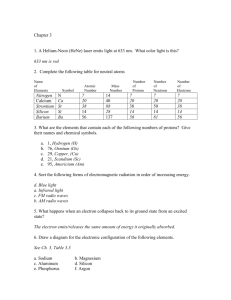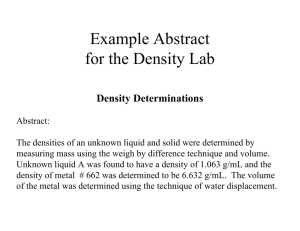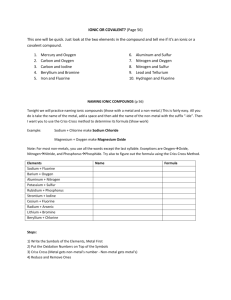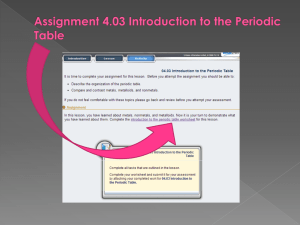Do Nows Periodicity_3
advertisement
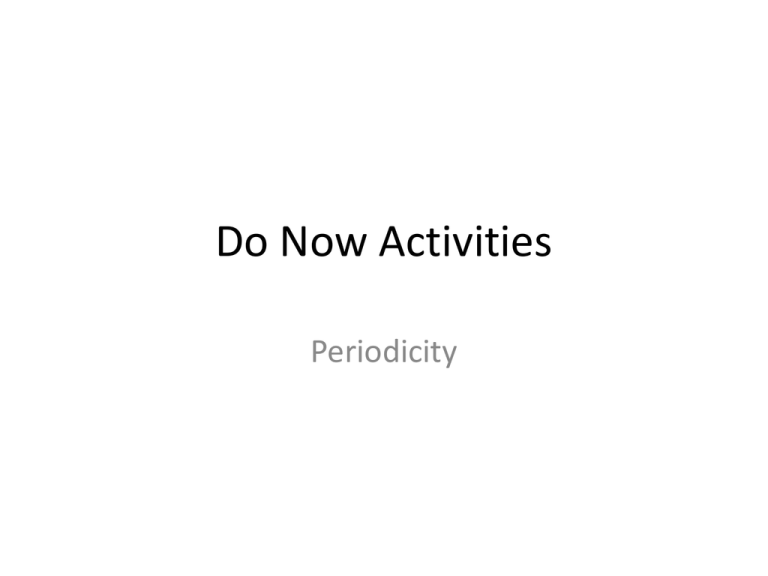
Do Now Activities Periodicity Do Now 10/27/14 1. Find your assigned group and pick a location to sit. a. Groups of 3 get middle priority b. All group members should be sitting together. c. Be polite – do not complain about your group. We need to hear different ideas, not just those of our friends. 2. Work independently on the pre assessment. Note the fixed error listed on the board. 3. I will let you see your test when we begin our group activity for the day. Do Now 10/28/14 • Take out your work from yesterday. • Person A is manager – make sure to finish by today. • Person B is reader – reads instructions and summarizes answers. • Person C is document controller- make sure everyone has the same answer before moving on and be ready to answer my questions. • Person D is Technician – put away all equipmet and turn in all summary forms with the alien chart at the end. Do Now 10/29/14 1. Turn in Alien activity within 5 minutes. 2. Pick up Element card activity (or take your activity out) 3. Finish this activity by the end of class 1. It is a thinking and explanation activity not a “right answer” kind of activity. 2. A- Technician B- Manager C- Reader/Spokesperson D – Document controller Do Now: 10/30/14 • Draw a Bohr model of nickel. Complete next • Turn in element card activity ASAP. • Get 1 grey sheet with instructions and 4 white scratch sheets of paper to draw Bohr Models on. • This activity is due ½ way through Monday. 1. I WILL check your answers on this one if you need help. There is a right answer! 2. A – Document controller B- Technician C- Manager D- Reader/Spokesperson Honors Chem Do Now 10/31/14 1. You may work on drawing bohr models individually during the video clips. 2. You may not talk during video clips. 3. Be ready to share which job looks most interesting/was most surprising to you to involve science. 4. Be ready to share which job is of least interest to you. Do Now 11/3 • Take out Bohr Models. • Attach in order AND pattern of periodic table. • Look for patterns in the electrons in the rows(periods) and columns (groups/families) Do Now 10/4 1. Pick up a reflection sheet. 2. Come get your progress report when called. 3. Reflect independently on your work for this quarter. 4. Get progress report signed by a parent/guardian by Thursday. Do Now 10/5 1. An unknown material has been discovered. Describe a test that you could perform to determine if it is a metal or a non-metal. What would the outcome of the test be if it was a metal? A non-metal? 2. What do the elements nitrogen, phosphorus and arsenic have in common? Be specific. 3. What do the elements boron oxygen and neon have in common? Be specific. 4. An element has the electron configuration 1s22s2s2p63s23p5. Which period and group is it found in? Do Now 11/6 1. Identify the following elements as metals, nonmetals or metalloids. a. iron b. sodium c. calcium c. aluminum d. arsenic e. Sulfur 2. What do the elements fluorine, chlorine and bromine have in common? Be specific with #s 3. What do the elements calcium, copper and selenium have in common? Be specific with #s. Do Now 11/7 1. Identify the name of the family for the following elements. a. Magnesium b. Sulfur c. aluminum d. Cobalt e. Krypton f. oxygen 2. Identify whether the following are metals, nonmetals or metalloids. a. Silicon b. potassium c. argon d. lithium 3. Which group and period is the following element found in? 1s22s22p63s23p64s23d104p65s1 Do Now 11/12 1. Turn in pre lab to front counter. 2. Take out goggles and something to write with. Do Now 11/13 3 minutes after bell we will check 1. Given the element described by the electron configuration 1s22s22p63s23p64s23d104p3 a. b. c. d. In what period is the element located? Name the family to which the element belongs. Which group number is the element a part of? Is the element a metal, non-metal or metalloid? Do Now 11/14 1. Last week we investigated coulombic attraction. a. What is coulombic attraction? b. Does coulombic attraction increase or decrease as you move down a group? Why? c. Does coulombic attraction increase or decrease as you move left to right across a period? Why? Do Now 11/17 1. Describe and explain the pattern for metal reactivity a. As you move from bottom to top on the periodic table. b. As you move from right to left on the periodic table. 2. Often non-metals react by gaining extra electrons (trying to get to 8 on the outside shell). Use coulombic attraction to predict which non-metal is the most reactive. Do Now 11/21 1. Look at your knowledge organizer. Which concept is your strongest? Which is your weakest? 2. Look at your review sheet (or any other hw) to see if there are any questions you think we should go over as a class. Be ready to say the worksheet (color or name) and the problem number.
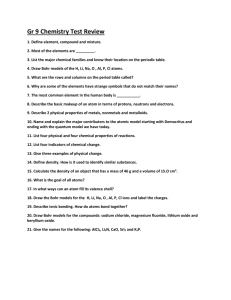
![[RH] Chemistry - Hodder Education](http://s3.studylib.net/store/data/009655449_1-244c3ac98c70ac57156679dff49dd5a0-300x300.png)
